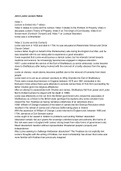Summary
Summary GV100 John Locke Reading/ Lecture Notes
- Course
- Institution
- Book
These are notes on the work and life of philosopher John Locke. The notes have been used to assist in producing high-quality 1st class work. Ideal material for revision/ assessment preparation.
[Show more]




